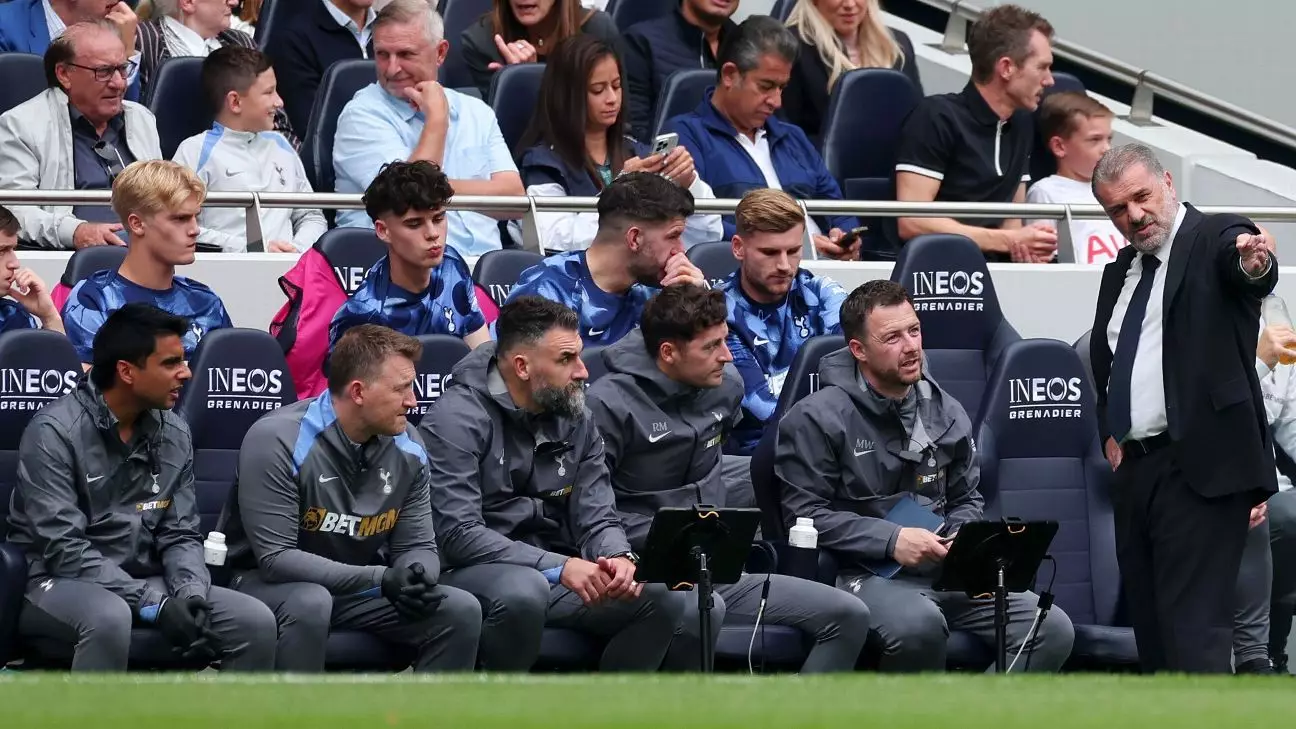In modern football, the success of a team often hinges not just on the skill of its players, but equally on the strategies and philosophies employed by the coaching staff. At the sprawling training facilities of Tottenham Hotspur in Enfield, North London, this philosophy is put into action under the guidance of head coach Ange Postecoglou and his dedicated team. Following a recent UEFA Europa League match that saw them suffer a tight defeat against Galatasaray, the Spurs’ coaching staff had little time to mourn their loss, turning their focus immediately onto their next Premier League challenge against Ipswich Town.
For the coaching team, including Mile Jedinak and Nick Montgomery, there is no rest for the weary. Their journey back from Istanbul concluded around 3:30 AM, and they quickly transitioned from the fatigue of travel back to the rigors of planning and preparation. The seamless flow from one responsibility to another is emblematic of the modern football coaching landscape, where adaptability is paramount.
As Jedinak eloquently stated, the responsibilities of the coaching staff are interconnected as they meticulously plan training schedules, conduct morning meetings, and analyze the opposition—all before the players even step onto the pitch. The narrative of exhaustion is palpable yet so is the enthusiasm. The diligence of the coaching team reflects their ambition to have the squad well-prepared and informed, not just physically but mentally for the challenges that lie ahead.
The preparations epitomize a relentless pursuit of excellence; every drill, meeting, and tactical discussion contributes to the team’s development, reinforcing the idea that success in football is not merely about athleticism but also about strategy and mental fortitude. Jedinak’s experience as a former player provides him with a unique perspective as he articulates how the detailed planning process opens one’s eyes to the complexities of coaching, which often go unnoticed by those on the field.
Ange Postecoglou stands out not only for his tactical acumen but for how he leverages trust within his coaching team, creating an environment conducive to open dialogue and collaboration. The empowerment felt by assistants such as Montgomery is central to understanding how effective leadership can facilitate a thriving coaching ecosystem. When Jedinak and Montgomery speak of the culture at Tottenham, they describe a balancing act between solidarity and professional distance that allows coaches to challenge players while remaining accessible.
Montgomery, who has traversed various leagues and noted the differing resources, emphasizes that the fundamental principles of training and player management remain consistent across levels. The camaraderie among the coaching staff and the active inclusion of youth players reflects Postecoglou’s vision of a forward-thinking football club. They focus not only on orchestrating immediate results but on laying a sustainable foundation for the team’s future.
This trust extends to the players as well, creating a familial atmosphere where every player feels their contributions are valued. Postecoglou’s nurturing of relationships allows for frank conversations that ultimately lead to improved performance on the pitch—a hallmark of great team management.
A Vision for Growth and Excellence
Both Montgomery and Jedinak aspire to more prominent managerial positions in the future, yet their current focus is entirely directed at cultivating Tottenham’s season. Their commitment highlights one of the prevailing truths of high-level sport: players and staff alike face immense pressure to consistently improve. The Premier League, known for its rigorous competition, does not allow for complacency.
In such a demanding environment, the coaching staff is tasked with finding ways to keep the players motivated and engaged. This certainly requires not just innovative training but also the ability to foster a culture where players are encouraged to push their limits daily. Jedinak and Montgomery resonate with that challenge as they strive to incorporate both collective and individual development into their training regimens.
What truly underscores the narrative crafted by the Spurs’ coaching team is their desire to impact future generations of coaches and players. Postecoglou’s vision extends beyond simply securing wins; he aims to open avenues for aspiring coaches and embed a culture of inclusivity and excellence within the sport.
Tottenham’s backstage operations reveal a tapestry of collaboration, passion, and dedication. The coaching team, driven by profound respect for each other and their players, navigates the pressures of elite football with a relentless focus on improvement. As they evolve, both tactically and personally, the philosophy at Hotspur Way embodies a commitment to both the present and the future of football excellence.

